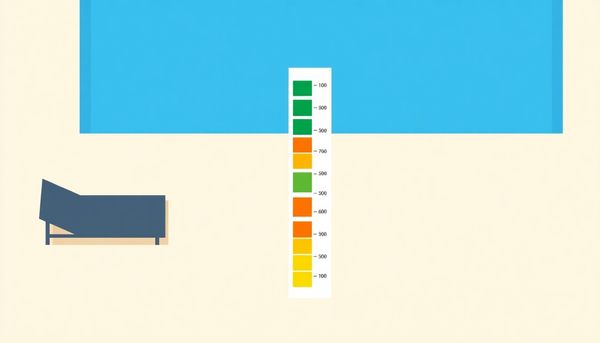Mastering Pool Upkeep: Selecting the Ideal Test Kit for Pristine Water
April 21th, 2024
April 21th, 2024
Grasping the subtle yet critical details of pool maintenance can feel like a kind of art. There’s something uniquely satisfying about the glistening shimmer of well-balanced water on a sunny day. A pool, after all, is more than just a patch of blue; it’s a hub of family gatherings, lazy afternoon floats, and energetic cannonballs. However, that pristine oasis doesn’t maintain itself. It relies on a delicate balance of chemicals to keep the water safe and inviting.
Reflecting on my own backyard pool adventures, I recall the trial and error of finding the right test kit. Early on, I struggled with murky waters and irritated eyes, not realizing the importance of precise readings. The world of pool test kits is vast, with each promising to deliver the most accurate insight into your water’s condition. But not all kits are created equal; some offer digital precision, while others rely on time-tested methods.
Choosing the best test kit can be daunting, but it’s an essential step to ward off algae blooms or scale buildup. We aim to guide you through this maze, highlighting those kits that stand out in quality and accuracy. Whether you're a seasoned pool owner or a newcomer eager to dive into maintenance, mastering the art of water testing ensures your pool remains a sparkling retreat.

Selecting the ideal pool test kit resembles choosing the right tool for a precise craft. Each kit offers unique benefits tailored to specific needs, whether you're a casual pool owner or a detail-oriented enthusiast. When ease of use and quick results are your primary concerns, test strips like AquaChek Select Connect become your best friend. They offer a straightforward method for checking essential parameters like pH and chlorine, providing results in seconds. This convenience makes them perfect for weekly checks without the hassle of intricate procedures.
For those seeking depth and detail, liquid test kits such as the Taylor Complete Pool and Spa Kit offer a more comprehensive approach. While requiring careful handling and more time, these kits provide a thorough analysis of your pool's chemistry. They cater to those who want to ensure every chemical aspect of their pool is perfectly balanced, from bromine to total alkalinity.
In contrast, the LaMotte Digital Reader presents a tech-savvy alternative, ideal for anyone who struggles with color differentiation or desires quick, accurate readings without interpretation guesswork. Although more expensive, the digital reader’s precision and ease can justify the additional cost, especially for frequent testers who value convenience.
Ultimately, choosing a pool test kit revolves around matching your lifestyle and pool care priorities with the strengths of each testing method. Whether it's simplicity, thoroughness, or technological advancement you seek, the right kit ensures your pool remains a sparkling oasis.
The art of pool maintenance begins with selecting the right testing method, a choice as personal as the swimsuit you wear to the pool. Each available option carries its unique advantages, tailored to fit the lifestyle and needs of every pool owner. For those who prioritize simplicity and speed, test strips like the AquaChek Select Connect 7-Way Pool & Spa Test Strips stand out. Their ease of use makes them ideal for quick, regular checks, offering a snapshot of seven critical chemistries without requiring much technical know-how. Just dip, wait, and read—it’s that straightforward.
For the meticulous tester who thrives on detail, liquid test kits such as the Taylor Complete Pool and Spa Liquid Test Kit offer a more in-depth analysis. These kits require a bit more effort but reward users with precise results. When accuracy is non-negotiable, the time spent measuring reagents and comparing colors pays off substantially. My friend swears by how these kits transformed her pool’s clarity, revealing nuances that strips might overlook.
Digital readers, like the LaMotte Digital Reader, appeal to the tech-savvy or those who often find color charts bewildering. These gadgets translate chemistry into numbers, providing clarity without the guesswork of color interpretation. Although generally more costly, their reliability and ease of use can make them worthwhile, especially if time and accuracy are paramount.
Choosing the right method is crucial, not just for your pool’s health but for peace of mind. Whether you’re a casual dipper or a dedicated pool curator, the right test kit can make all the difference in keeping your waters pristine.
Selecting the right pool test kit involves more than just grabbing the first one you see on the shelf. Each testing method offers its own set of features tailored to different needs. Test strips, for instance, are a convenient option for those who value speed and simplicity. With a quick dip and a glance at a color chart, you can gauge your pool's chemistry in seconds. They cover essential metrics like total chlorine and pH, making them perfect for routine checks. However, they might not capture the full spectrum of potential issues lurking beneath the surface.
For those desiring precision, liquid test kits are the champions. These kits require a bit more effort—adding specific reagents to a water sample and comparing it to a color chart—but they deliver comprehensive results. In the world of pool maintenance, accuracy is king, and liquid kits reign supreme by providing detailed insights into various chemical levels, from free chlorine to cyanuric acid.
Digital readers cater to tech enthusiasts who crave clarity without the hassle of color matching. These devices offer a digital readout of your pool's chemical state, often coming with memory functions to track changes over time. Though pricier, their ease of use and precision make them a worthwhile investment for meticulous pool owners. Understanding these features ensures you choose a kit that aligns with your pool maintenance routine and keeps your pool sparklingly safe.
In the realm of pool maintenance, the accuracy of your water test kit is as crucial as the water itself. I recall a summer when my pool seemed perfect to the eye, yet it was the test kit that revealed imbalances lurking beneath the surface. Choosing between test strips, liquid kits, and digital readers involves understanding what each offers in terms of precision.
Test strips are the go-to for many pool owners, given their simplicity and affordability. They're like the quick text message to your pool's deeper conversations, offering immediate feedback on several chemicals. However, their scope is somewhat limited compared to liquid kits. While they do provide a snapshot of essentials like pH and chlorine, they may not capture the nuances that a liquid test can reveal.
Liquid test kits, on the other hand, are akin to a detailed conversation. They require patience and a steady hand to add reagents to vials and interpret results against color charts. Yet, they promise a depth of understanding that strips can't match, especially when gauging intricate levels like acid demand or bromine.
For those who prefer a blend of ease and precision, digital readers like the LaMotte take the guesswork out of the process. While they come at a higher price, the accuracy and convenience they offer can be a worthy investment for meticulous pool caretakers.
In the end, the choice hinges on your priorities: speed and simplicity with strips, detailed accuracy with liquid kits, or a high-tech blend with digital readers. Each method has its merits, ensuring your pool stays a safe and enjoyable oasis.

In the bustling world of pool maintenance, simplicity often reigns supreme, especially when armed with test strips. Think of these strips as your trusty sidekick in the quest for pristine waters. They offer a quick, no-fuss method to check essential water parameters like total chlorine, pH levels, and alkalinity. Testing becomes as straightforward as dipping the strip into the pool, waiting for a brief moment, and then comparing the colors to an included chart. No intricate procedures or elaborate equipment needed.
AquaChek Select Connect 7-Way Pool & Spa Test Strips stand out as a top choice for many pool owners. Not only do they test for seven vital chemistries, but they also seamlessly integrate with a mobile app that deciphers results for you. This feature is particularly handy for those who might find reading color charts a bit challenging. The app not only interprets results but also offers tips to address any imbalances, making pool care less of a chore and more of a routine check-up.
For those who cherish efficiency and accuracy without the complexity, test strips are a compelling option. They fit snugly into a routine, allowing pool owners to conduct frequent checks without the hassle. While they may not delve as deep as liquid kits, their ease of use and cost-effectiveness make them perfect for regular, weekly assessments. Whether you’re a seasoned pool owner or a newcomer to pool care, these strips simplify maintenance, keeping your water sparkling with minimal effort.
Selecting the best test method for your pool is much like choosing the perfect tool for a craft project. Each option has its unique strengths, and understanding these can make a world of difference in maintaining that crystal-clear water. Test strips, for instance, stand out for their simplicity and speed. A quick dip, a brief wait, and you have a snapshot of your pool's chemistry—ideal for routine checks when time is of the essence. They're especially handy for weekly monitoring of basics like chlorine and pH levels.
On the flip side, liquid test kits offer a richer, more nuanced picture of your pool's health. While they require a bit more effort and patience, the depth of information they provide can be invaluable. These kits allow for precise adjustments to be made, given their detailed readings on multiple chemical levels. Imagine having a little laboratory at your fingertips, where you can tailor your pool's chemistry to perfection.
For those who prefer their technology with a sprinkle of magic, digital testers are a fantastic choice. They remove the guesswork from color interpretation, offering digital precision instead. Though they may demand a higher upfront investment, their ease of use and accuracy can be a game-changer for pool owners who want quick, reliable results without fumbling through shades of color.
Ultimately, the right choice hinges on your specific needs and comfort level. Whether you're a casual poolside lounger or a meticulous water quality guardian, there's a test kit out there that will fit seamlessly into your maintenance routine.
In the realm of pool maintenance, the humble test strip holds a reputation for being the swiftest and most convenient tool. Whether the sun is blazing or the clouds are rolling in, these strips are ready to provide a snapshot of your pool's health in mere moments. Armed with the ability to measure up to seven crucial chemistries — including pH, chlorine levels, and alkalinity — test strips serve as the go-to solution for quick, weekly checks.
AquaChek Select Connect offers a particularly user-friendly experience. These strips not only cover the basics but also enable you to track bromine and cyanuric acid levels. With a simple dip into the water and a brief wait, you have a clear indication of your pool's current state. Personally, I’ve found them indispensable for those busy weeks when detailed testing isn’t feasible. Just a quick dip, and I’m reassured that my pool is on the right track.
Beyond the ease of use, these strips are highly accessible. They come in a handy package, often accompanied by a mobile app that simplifies reading the results. This feature is especially beneficial for those who might struggle to discern subtle color changes. Moreover, the affordability of test strips makes them a staple in any pool owner's toolkit, ensuring you never skip a beat in maintaining optimal water conditions.
Navigating the world of pool maintenance can often feel like deciphering a code, especially when it comes to testing water chemistry. Enter digital readers—your high-tech ally in achieving pinpoint accuracy. Unlike traditional methods, digital readers provide precise readings without the guesswork of color interpretation. This advancement is particularly beneficial for those with difficulty distinguishing subtle color differences on test strips or liquid kits.
Digital readers, such as the LaMotte Digital Reader, operate with an LCD display that's both water-resistant and user-friendly. They efficiently test multiple parameters, including Free and Total Chlorine, Bromine, pH, Alkalinity, Calcium Hardness, and Cyanuric Acid, all with the push of a button. The convenience extends beyond accuracy; these devices store up to nine previous readings, allowing users to track changes over time.
Personal experience has shown that when using a digital reader, there's a reassuring confidence in knowing each data point is backed by technology. Gone are the days of squinting at color charts under different lighting conditions, trying to decide if you’re seeing mauve or magenta. Though digital readers come with a heftier price tag than strips or liquid kits, the simplicity and reliability they offer can prove invaluable, especially for pool owners who strive for perfection in water quality. Embrace this technological leap, and let digital readers guide you to crystal-clear waters with ease.

In the realm of pool maintenance, precision is the name of the game, and liquid test kits are your ace in the hole. Unlike their strip counterparts, these kits delve deeper, offering insight into a broader spectrum of chemical levels. The Taylor Complete Pool and Spa Liquid Test Kit, for instance, is a favorite among pool professionals for its meticulous accuracy. It allows you to scrutinize chlorine, bromine, pH, acid demand, and total alkalinity with meticulous care.
My neighbor swears by his liquid test kit. Every weekend, he meticulously measures the reagents into vials, like a chemist at work. This routine might seem tedious to some, but for him, it’s a ritual that ensures his pool remains in perfect balance. By adding the right drops and carefully matching colors to a chart, he knows the exact state of his pool's chemistry.
Each test is like a mini-experiment, demanding a steady hand and attention to detail. The benefit? High precision and the satisfaction of knowing you've done it right. However, keep in mind that liquid kits require periodic replacement of reagents and proper storage to maintain their reliability. They also don't test for every possible parameter—such as salt levels—but when it comes to the essentials, their accuracy is hard to beat. If precision is your pool's best friend, a liquid test kit is your most trusted ally.
Navigating the world of pool testing methods may seem daunting, but choosing the right tools can transform this task into a straightforward routine. Each testing method—whether strips, liquid kits, or digital readers—serves its own purpose, matching varying needs for accuracy and convenience.
For those who prioritize ease and efficiency, test strips are the go-to choice. They offer a quick snapshot of your pool’s chemistry, covering essentials like pH and chlorine levels. However, ensure you store them properly to maintain their accuracy, as moisture and contamination can skew results. I recall once leaving my strips in a humid garage, resulting in unreliable readings that had me adjusting my pool’s chemicals unnecessarily.
If precision tops your list, liquid test kits offer a more detailed insight. They require you to measure reagents meticulously, almost like a mini chemistry experiment. This method digs deeper into your water’s health, but beware of overzealous drips—too much reagent throws off your findings. I’ve found the Taylor Complete Pool and Spa Liquid Test Kit particularly reliable, albeit with a learning curve for the uninitiated.
Digital readers take the guesswork out of color comparison, offering clear numerical results. They are perfect for those wary of interpreting subtle color changes on charts. While initially pricier, the convenience and accuracy they provide can save time and effort in the long run. Whatever path you choose, the goal remains the same: a sparkling, safe pool ready for any splash.
Selecting the perfect pool test kit can feel akin to being a detective. The right tools can unravel the mysteries of your pool's chemistry. My friend Alex, a seasoned pool owner, once shared a tale of his early days in pool maintenance. Armed with only test strips, he found them to be a great starting point. For those valuing simplicity and efficiency, test strips like AquaChek Select Connect are a go-to option. They deliver swift readings for seven critical chemistries, including pH and chlorine levels, in mere seconds.
However, as Alex's pool chemistry knowledge deepened, so did his needs. He transitioned to the more comprehensive Taylor Complete Pool and Spa Liquid Test Kit. Liquid kits, while demanding a bit more time and precision, offer unmatched accuracy. They cater to those who relish the ritual of testing, providing detailed insights into chlorine, bromine, and alkalinity levels. The process involves adding precise reagent drops to a sample and matching colors, reminiscent of a fun science experiment.
For those who struggle with color distinctions or desire a modern touch, digital testers like the LaMotte Digital Reader are an appealing alternative. These devices remove the guesswork, offering clear digital readings. Though pricier, they ensure peace of mind with their precise results.
Ultimately, the right choice depends on your priorities: ease, accuracy, or technology. Each kit type caters to different needs, ensuring your pool remains a safe and sparkling oasis.
The allure of shimmering pool water isn't just about aesthetics; it's about crafting a safe and healthy environment for swimmers. When precision is paramount, liquid test kits emerge as the champion in accuracy. Unlike test strips, which offer a quick snapshot, liquid kits dive into the details, providing a thorough analysis of your water’s chemistry.
Consider the Taylor Complete Pool and Spa Liquid Test Kit—its robust reputation among pool enthusiasts comes from its reliability. With it, you can gauge critical parameters like chlorine, bromine, and pH levels with an impressive degree of precision. The process involves adding specific chemical reagents to your water sample, each drop revealing more about your pool's health. This method reduces the risk of misinterpretation common with color-coded charts, making it ideal for those keen on exact results.
On a personal note, many pool owners, myself included, find the process of using liquid kits almost ritualistic. It’s akin to a science experiment that ensures peace of mind, knowing every swimmer is protected from potential hazards. However, be mindful of the kit’s needs—these reagents thrive in stable temperatures and need periodic replacement to stay effective.
Ultimately, while test strips can suffice for routine checks, a liquid test kit is your go-to for comprehensive assessments. For those who demand excellence, it's an investment in clarity and confidence when it comes to maintaining a pristine pool.

Navigating the world of pool chemistry can often feel like deciphering a complex puzzle. However, embracing comprehensive pool chemistry solutions can transform this task into a smooth sailing experience. For those who appreciate simplicity without compromising on results, test strips like the AquaChek Select Connect provide a swift and straightforward method. In just seconds, they evaluate essential parameters such as pH, chlorine, and cyanuric acid, making them a staple for regular weekly checks. A personal favorite among many pool owners, these strips come with a handy mobile app that demystifies the reading process.
For enthusiasts who wish to delve deeper into their pool's chemical makeup, liquid test kits, such as the Taylor Complete Pool and Spa Kit, offer a more detailed insight. This kit not only measures common elements like chlorine but also examines bromine and acid demand. While using these kits might require a bit more time and precision, the reward is a richer understanding of your pool’s chemical balance.
Alternatively, for tech-savvy individuals or those who struggle with color matching, digital readers like the LaMotte offer precise, user-friendly solutions. With a few button presses, they present data on an easy-to-read display, storing past results for convenient comparison. These devices might carry a heftier price tag, but their accuracy and ease of use often justify the investment. Whichever method you choose, understanding your pool’s chemistry profoundly enhances the swimming experience, ensuring clear, safe water for everyone.
Navigating the vast sea of pool test kits can feel a bit like searching for the perfect pair of shoes. Each type of test kit offers unique benefits and caters to different needs, so selecting the right one depends on your specific requirements for pool care. Start with simplicity if quick checks are your priority. Test strips like the AquaChek Select Connect provide a fuss-free, rapid assessment of essential water chemistries. You dip a strip, wait a moment, and voilà, your water's vital stats are in your hands, ready to be interpreted with the help of a nifty mobile app.
For those who prefer depth over speed, liquid test kits are a comprehensive option. The Taylor Complete Pool and Spa Liquid Test Kit offers a detailed analysis of your pool’s condition, measuring everything from pH levels to total alkalinity. The precision of liquid reagents ensures accurate results, but the process involves a bit more effort and time. You might find yourself feeling like a chemist in your own backyard, meticulously matching colors to a chart.
If tech is your ally, consider a digital reader like the LaMotte Digital Reader. It removes the guesswork of color comparison and delivers clear, precise readings. Although the initial cost is higher, its ease of use and reliable results make it a worthwhile investment for many. In the end, the best test kit is the one that seamlessly fits into your routine and delivers the information you need to keep your pool sparkling clean.
Testing your pool water weekly isn't just a chore—it's a safeguard for your backyard oasis. Ensuring the right chemical balance keeps your pool sparkling clean and safe for swimmers. But with various methods at your disposal, optimizing your testing routine becomes crucial.
Test strips, like the AquaChek Select Connect 7-Way Pool & Spa Test Strips, offer a quick snapshot of your pool’s health. They're like the trusty friend who’s always there when you need them. With the ability to measure total chlorine, bromine, pH, and more in seconds, these strips are perfect for a fast check-in. Paired with a mobile app, interpreting results becomes a breeze, making them ideal for those new to pool maintenance or those who prefer simplicity.
For those who demand precision, the Taylor Complete Pool and Spa Liquid Test Kit delivers. It’s akin to a gourmet chef meticulously crafting each dish. By adding specific reagents to your water samples, you get a detailed view of each chemical level. The downside? This method requires more time and a steady hand but rewards you with detailed insights.
Digital readers, such as the LaMotte Digital Reader, cater to tech enthusiasts who prefer gadgets that do the thinking. Offering definitive results without the guesswork of color matching, they serve as a high-tech ally for precise monitoring.
Choosing the right method hinges on your needs: convenience, detail, or technology. Regardless, regular testing ensures your pool remains a pristine sanctuary.
Managing pool chemistry can often feel like navigating a science experiment. You want your pool to be a safe oasis, not a breeding ground for bacteria. The key? Simplicity in testing. Whether you're a seasoned pool owner or a newcomer, choosing the right testing method is crucial, and understanding their idiosyncrasies can make a significant difference in your pool maintenance routine.
Consider test strips like the AquaChek Select Connect 7-Way Pool & Spa Test Strips, an uncomplicated solution that quickly assesses seven essential chemistries. They are perfect for those weekly checks, giving you instant feedback on factors like pH and chlorine levels. My neighbor swears by them for their sheer convenience, especially when time is of the essence and you want a snapshot of your water's health.
For those who don’t mind spending a bit more time for accuracy, liquid test kits such as the Taylor Complete Pool and Spa Liquid Test Kit offer a comprehensive approach. These kits delve deeper into your pool’s chemistry, providing detailed insights into various chemical levels. Although it takes a few extra minutes to conduct the tests, the precision is well worth it, especially if you’re aiming for crystal-clear perfection.
If technology is your ally, a digital reader like the LaMotte Digital Reader simplifies the process even further. With its user-friendly interface, it eliminates the guesswork of reading color-coded charts. My cousin, who has a penchant for gadgets, finds this option indispensable, especially given its ability to store previous results and provide a clear, no-nonsense reading.
In the end, whatever method aligns with your lifestyle, the goal remains the same: maintaining a balanced, inviting pool with minimal fuss.

When it comes to maintaining pool water clarity and safety, accuracy in testing cannot be overstated. A friend of mine once marveled at her crystal-clear pool, only to discover later that improper testing had masked a chlorine imbalance. This highlights the need for precise methods. While options like test strips, liquid kits, and digital readers abound, each has its strengths.
Test strips provide a swift snapshot of essential water chemistry, perfect for a quick check before a swim. They are user-friendly, requiring only a short dip in the water, but they might not catch every nuance. I've found them handy for weekly assessments; however, their limited scope means occasional inaccuracies. Always ensure they’re fresh and stored properly to maintain reliability.
On the other hand, liquid test kits, though they demand more effort, offer a deeper dive into your pool’s chemistry. By adding reagent drops to a water sample, you get a clearer view of various parameters. The process is akin to a mini chemistry experiment, requiring precision. A meticulous approach ensures that you catch discrepancies that strips might miss, making them ideal for monthly thorough checks.
For those who prefer a hassle-free experience, digital readers provide clarity and precision without the guesswork of color charts. They are perfect for tech-savvy pool owners who value detailed data at the push of a button. Although pricier, their convenience and accuracy often justify the investment. Each method has its place, and using them in tandem can keep your pool pristine and inviting.
Selecting the ideal pool test kit can feel like navigating a maze, especially when options abound with varying levels of complexity. Each type of kit caters to a different need, much like choosing between a quick morning espresso or a leisurely brewed coffee. For those who appreciate simplicity and speed, test strips like the AquaChek Select Connect are a popular choice. They serve as a reliable companion for weekly checks and cover seven essential chemistries, including pH and chlorine, in mere seconds. Their user-friendly nature, paired with a mobile app for easy interpretation, makes them a go-to for busy pool owners.
Conversely, if precision and depth are your priorities, the Taylor Complete Liquid Test Kit might be more your speed. This kit demands a bit more involvement, as it requires mixing reagents and comparing colors, but offers comprehensive insights. It’s akin to having an expert diagnostician for your pool, revealing details about chlorine and bromine levels with remarkable accuracy. Just remember, these kits thrive when fresh and well-stored, ensuring their reagents deliver reliable results.
For tech enthusiasts or those who shy away from color matching, a digital reader like the LaMotte Digital Reader might be the best fit. Its digital readout simplifies the process, providing clear results without the guesswork. While this option may be on the pricier side, the convenience and accuracy it offers can be worth the investment, especially for those who prefer a high-tech approach to pool care.

This article provided insights into maintaining your pool. Start your pool care journey today!
Want to become a pool maintenance expert? Our free Pool School course covers everything you need to know about pool care. From basic maintenance to advanced troubleshooting, you'll learn how to:
Join over 10,000 pool owners who have already transformed their pool care routine. Get started with our free Pool School course today!